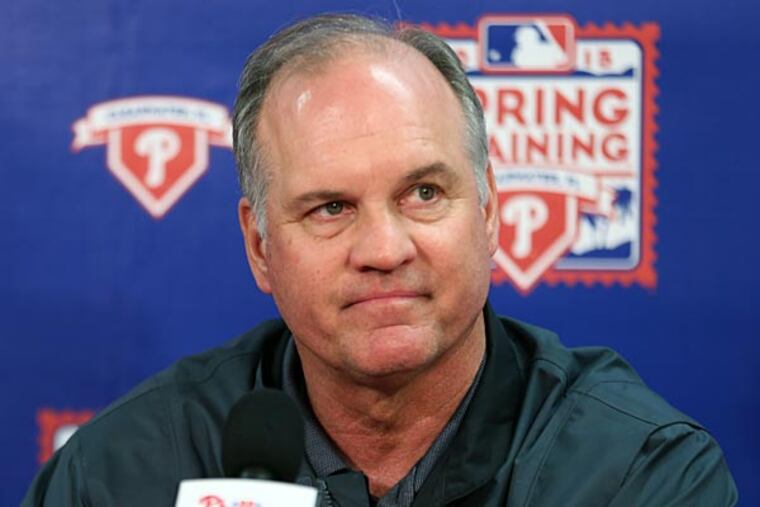Sandberg feels Phillies can win with 'situational baseball'
The Phillies will struggle to score runs this season. Not even the general manager, Ruben Amaro Jr., has disputed that fact. Baseball Prospectus projects the team's worst offensive output in four decades.

The Phillies will struggle to score runs this season. Not even the general manager, Ruben Amaro Jr., has disputed that fact. Baseball Prospectus projects the team's worst offensive output in four decades.
So it made plenty of sense that for his second spring as Phillies manager, Ryne Sandberg preached situational hitting to those in Camp Clearwater. Home runs figure to be scarce, so finding other ways to move runners is necessary. Sandberg seeks more productive at-bats.
Expect plenty of bunts, more hit-and-runs, and more movement on the basepaths in general for Year 2 of Sandberg's major-league managerial tenure. Executing "the little things" was discussed all spring.
"Playing situational baseball is what I call it," Sandberg said. "I don't call it small ball. I call it situational baseball."
A year after the Phillies again added to their payroll to try to win with their aging core, Sandberg finds himself a steward of a roster in transition. Gone are Jimmy Rollins, Marlon Byrd, A.J. Burnett, and Antonio Bastardo. In are stop-gaps such as Aaron Harang and Chad Billingsley and young players such as Odubel Herrera.
There were bumps in the road during Sandberg's first season, the Phillies' second consecutive 89-loss campaign. He benched Rollins during spring training and a struggling Ryan Howard in late July. In August two players, Domonic Brown and David Buchanan, publicly questioned how they were used.
Before spring training, Sandberg vowed a more hands-on approach. He divvied up all the position players in camp into hitting groups led by the likes of Hall of Famer Mike Schmidt and former manager Charlie Manuel.
Sandberg and his staff are taking less for granted this season, the manager said. He said he saw improved at-bats in Grapefruit League play, more hitters battling for longer at-bats and avoiding strikeouts.
"I feel real good about what we've established about some team concepts, both on the pitching side of things, defense, and on the offensive side of things," Sandberg said.
"We'll continue to work at that, and I think what spring training did was really set the tone for the season on what we have to do and what our routine will be as far as staying on top of things to keep everybody sharp on game situations."
Sandberg avoided using the word rebuilding in conversation. The manager of the team can't have that mind-set, even if it is the reality. A successful season, Sandberg said, would be "for our guys to show improvement from day one until the end. To scrap out wins. To see improvement in some younger players that will be also gaining experience."
"But the goal remains to have a lineup and to prepare to win a game everyday," he added. "That will still be the message."
Sandberg played for an array of managers throughout his Hall of Fame career. Lee Elia stuck with him as a rookie, providing the confidence that allowed the second baseman to turn a corner. Jim Frey unlocked his power and coached him to an MVP season. The late Don Zimmer managed Sandberg and the Chicago Cubs to the 1989 NLCS. The beloved Zimmer "liked to push the envelope and make something happen to win a baseball game," Sandberg said.
Sandberg regards each of them - as well as Dallas Green - as mentors. He mentioned them as well as Larry Rojas, his first skipper when an 18-year-old Phillies minor-leaguer in Helena, Mont., while speaking before a recent game. He sat in a dugout next to Paul Molitor of the Minnesota Twins about an hour before they became the first Hall of Famers to oppose each other as managers.
That afternoon, while he and Molitor discussed their managerial paths, Sandberg was asked about the patience it took for him to manage six seasons in the minor leagues. Patience, he said, he learned earlier in his playing career. He was, after all, a lifetime .230 hitter in April, he pointed out.
That same patience will surely come in handy again this season, as the Phillies continue to build toward the future.
@jakemkaplan